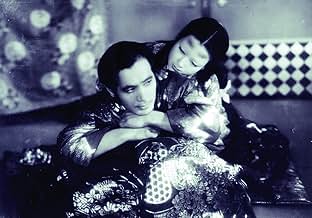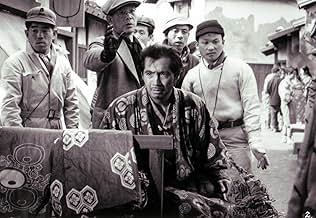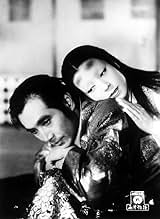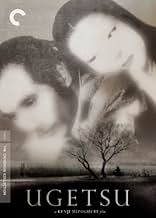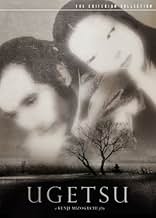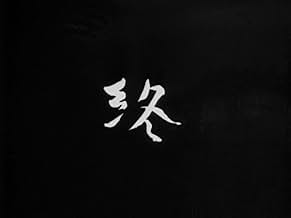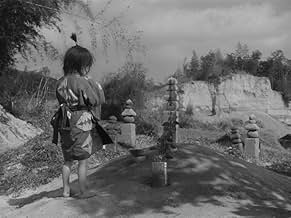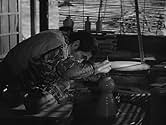A tale of ambition, family, love, and war set in the midst of the Japanese Civil Wars of the sixteenth century.A tale of ambition, family, love, and war set in the midst of the Japanese Civil Wars of the sixteenth century.A tale of ambition, family, love, and war set in the midst of the Japanese Civil Wars of the sixteenth century.
- Nominated for 1 Oscar
- 6 wins & 2 nominations total
Eitarô Ozawa
- Tôbei
- (as Sakae Ozawa)
Featured reviews
The movie starts out pretty uncomfortably, two peasants in 16th century Japan who dream of richness and glory so blindly, they can't even hear the pretty straight-forward protests of their loving wives who try to convince them that their happiness is fine at home. When one, a pottery smith, makes a small bundle selling his wares, they decide to make a much larger batch together and become rich.
Forced out of their homes by an approaching war and uncertain where to go, they take their wares to a thriving market place, where the second peasant's ambition to be a samurai divides them and causes all four characters, the two peasants and their wives, to be separated, all fending for themselves amongst the war and various classes differently.
At this point the film reverses itself and instead of being a pretty skin-deep, tragic bud of greed, it blooms into a beautiful and haunting tale of obsession and illusion. The two main stories of the peasants and their wives are opposite only in their imaged realism, where one peasant falls completely under the curse of an enchanting ghost and the other lies and steals his way to fame, only both of them are eventually knocked down from their own hubris and forced to finally awaken to what their wives have said all along.
It's quite exquisite, this movie, with its long takes and its lack of the usual constructs that make up messages of obsession and greed. Once it gets beyond the small, uncomfortable, claustrophobic world of the peasant's home, it becomes audaciously challenging and mysterious, so that the same small home becomes amazingly wonderful and comforting. The very essence of the movie is breathed into the emotions of the audience in very subtle ways, making a very unforgettable cinematic experience.
--PolarisDiB
Forced out of their homes by an approaching war and uncertain where to go, they take their wares to a thriving market place, where the second peasant's ambition to be a samurai divides them and causes all four characters, the two peasants and their wives, to be separated, all fending for themselves amongst the war and various classes differently.
At this point the film reverses itself and instead of being a pretty skin-deep, tragic bud of greed, it blooms into a beautiful and haunting tale of obsession and illusion. The two main stories of the peasants and their wives are opposite only in their imaged realism, where one peasant falls completely under the curse of an enchanting ghost and the other lies and steals his way to fame, only both of them are eventually knocked down from their own hubris and forced to finally awaken to what their wives have said all along.
It's quite exquisite, this movie, with its long takes and its lack of the usual constructs that make up messages of obsession and greed. Once it gets beyond the small, uncomfortable, claustrophobic world of the peasant's home, it becomes audaciously challenging and mysterious, so that the same small home becomes amazingly wonderful and comforting. The very essence of the movie is breathed into the emotions of the audience in very subtle ways, making a very unforgettable cinematic experience.
--PolarisDiB
10lwalsh
Having read much about this film, I thought I knew what to expect when I finally had the chance to see it. I was wrong; no amount of writing can convey the richness and impact of the images and the overall flow of the film-- which is why this commentary will be brief. Suffice it to say that I recommend this film wholeheartedly to anyone looking for cinematic poetry (though not, probably, to those who, misled by its being set during the Japanese Civil Wars, expect an action film).
Perhaps the most striking thing about the film is the camera-work; on a first viewing one is scarcely aware of it much of the time, but the camera is in constant motion, emblematic of the restlessness which pervades not only the era and the central characters but, by implication, all of human life (in this regard, it's a very Buddhist film). This movement is never gratuitous; when the scene demands little or no movement the camera stays still. Notice, though, how often the camera's movement enhances the emotional impact of the scene, especially in the famous panning shot (not, as occasionally described, a 360 degree shot) of the reunion near the end. Along with this is Mizoguchi's penchant for long takes, which seduce the viewer into the rhythm of the film without calling attention to themselves or to his cleverness as a director.
But these are technical comments which may or may not be helpful in focussing a viewer's attention; what really matters is the film itself as a whole. It is truly beautiful, and powerful in the unexpected way of great poetry. Technique and emotion, simplicity of means and complexity of effects, walk hand-in-hand here, and the result is remarkable in a way which film rarely attains.
Perhaps the most striking thing about the film is the camera-work; on a first viewing one is scarcely aware of it much of the time, but the camera is in constant motion, emblematic of the restlessness which pervades not only the era and the central characters but, by implication, all of human life (in this regard, it's a very Buddhist film). This movement is never gratuitous; when the scene demands little or no movement the camera stays still. Notice, though, how often the camera's movement enhances the emotional impact of the scene, especially in the famous panning shot (not, as occasionally described, a 360 degree shot) of the reunion near the end. Along with this is Mizoguchi's penchant for long takes, which seduce the viewer into the rhythm of the film without calling attention to themselves or to his cleverness as a director.
But these are technical comments which may or may not be helpful in focussing a viewer's attention; what really matters is the film itself as a whole. It is truly beautiful, and powerful in the unexpected way of great poetry. Technique and emotion, simplicity of means and complexity of effects, walk hand-in-hand here, and the result is remarkable in a way which film rarely attains.
One of the greatest of all Japanese films, this makes many Top 10 lists of the greatest films of all time.
Genjuro (Masayuki Mori), a potter, and his brother Tobei (Eitaro Ozawa), a farmer, are seeking fame and fortune, or fortune and fame as the names are listed.
The lake scene is not to be missed. It is beautiful and creepy. After being warned about pirates, the two me head off alone and meet Machiko Kyo, who was also the woman in Rashomon.
There is a beauty in this film that can't be described adequately. The camera paints a picture that is enchanting and melodic.
Kenji Mizoguchi, who went on to do the magnificent Sansho the Bailiff, has given us a pleasure that will be enjoyed again and again.
Bruce Bennett at the New York Sun said it best, "When the name Kenji Mizoguchi is intoned, every piece of camera equipment on earth should execute a deep bow."
Genjuro (Masayuki Mori), a potter, and his brother Tobei (Eitaro Ozawa), a farmer, are seeking fame and fortune, or fortune and fame as the names are listed.
The lake scene is not to be missed. It is beautiful and creepy. After being warned about pirates, the two me head off alone and meet Machiko Kyo, who was also the woman in Rashomon.
There is a beauty in this film that can't be described adequately. The camera paints a picture that is enchanting and melodic.
Kenji Mizoguchi, who went on to do the magnificent Sansho the Bailiff, has given us a pleasure that will be enjoyed again and again.
Bruce Bennett at the New York Sun said it best, "When the name Kenji Mizoguchi is intoned, every piece of camera equipment on earth should execute a deep bow."
10notmicro
This holds a special place in my heart, and I still consider it to be absolutely one of the very greatest films ever made for adults. The work of a mature artist, it resonates with Buddhist practice, and is a profoundly moving tale of the suffering of the human condition, the violence of war, the possibilities of art uplifting the spirit, the possibilities of redemption of character. The closing scene is one of such deeply-felt compassion and understanding that it is almost frightening; it prefigures in a way the stunning and more personal close of the subsequent Mizoguchi film "Sansho the Baliff".
On a lighter level, it is an amusingly sly allegory of the actual history of Japan for the 20 or so years prior to 1953, where in the end the women, embittered (or dead) as a result of their men's quixotic quest for military glory or war-profiteering, entreat them to give up their misguided and destructive dreams, settle down, and get back to their real responsibilities.
Which they did.
Originally available on LaserDisc.
On a lighter level, it is an amusingly sly allegory of the actual history of Japan for the 20 or so years prior to 1953, where in the end the women, embittered (or dead) as a result of their men's quixotic quest for military glory or war-profiteering, entreat them to give up their misguided and destructive dreams, settle down, and get back to their real responsibilities.
Which they did.
Originally available on LaserDisc.
In a time of unceasing turmoil, as sixteenth-century Japan is ravaged by marauding bands of warriors, the ambitious and hard-working potter, Genjuro, and his aspiring samurai brother, Tobei, risk a dangerous trip to the bustling city to sell their wares, seeking quick profit. The two 16th century Japanese peasants venture from their homes in pursuit of dreams, resulting in fateful consequences. As Tobei abandons his wife to buy a samurai outfit and seek fame and fortune, while Genjuro becomes involved with a ghost woman.
The classic film ambition, family, and war that established Migozuchi's reputation outside of Japan. A marvellous mix of drama, comedy, action and supernatural events with nifty camera movement . Based on two stories by the 18th century writer Akinara Ueda (often described as the japanese Guy de Maupassant), dealing with two peasants in pursuit of dreams and encounter little more than their own hapless folly and a bit of the supernatural. Gorgeous cinematography in black and white, inspired by nihonga (traditional Japanese painting) and woodblock prints. ¨Ugetsu¨ was one of a handful of Japanese films to sweep up awards at European festivals in the early 50s. Its reputation as one of Migozuchi's finest works and a landmark of the Japanese art cinema has remained undented ever since. The filmmaker's unique stablishment of atmosphere by means of long shot, long takes, sublimely graceful and unobtrusives camera movement, is everywhere evident in his treatment of the legend of a potter who leaves his family to market his wares during the ravages of a civil war, and is taken in and seduced by a ghost princess.
This ravishingly composed, evocatively made motion picture was competently directed by Kenji Migozuchi. He is said to be the first major feminist film-maker, his films frequently reveal women's positions in Japanese society, he includes long takes, often held for the duration of the scene. Migozuchi is cited Marcel L'Herbier, Josef von Sternberg, William Wyler and John Ford as his influence. Migozuchi is one of the rare directors who has helmed over 100 films, including the following: ¨Street of shame, Princess Yang Kwei Fei, Shin Heike Monogatari, The crucified lovers, Sansho the bailiff, A Geisha, Life of Oharu, Utamaro and his five women, Ronin part 1 and 2, The story of the late Chrysanthemum, Osaka elegy, and Sisters of the Gion¨. Rating Ugetsu: 7.5/10. Better than average, well worth watching. The film will appeal to Japanese classic fans.
The classic film ambition, family, and war that established Migozuchi's reputation outside of Japan. A marvellous mix of drama, comedy, action and supernatural events with nifty camera movement . Based on two stories by the 18th century writer Akinara Ueda (often described as the japanese Guy de Maupassant), dealing with two peasants in pursuit of dreams and encounter little more than their own hapless folly and a bit of the supernatural. Gorgeous cinematography in black and white, inspired by nihonga (traditional Japanese painting) and woodblock prints. ¨Ugetsu¨ was one of a handful of Japanese films to sweep up awards at European festivals in the early 50s. Its reputation as one of Migozuchi's finest works and a landmark of the Japanese art cinema has remained undented ever since. The filmmaker's unique stablishment of atmosphere by means of long shot, long takes, sublimely graceful and unobtrusives camera movement, is everywhere evident in his treatment of the legend of a potter who leaves his family to market his wares during the ravages of a civil war, and is taken in and seduced by a ghost princess.
This ravishingly composed, evocatively made motion picture was competently directed by Kenji Migozuchi. He is said to be the first major feminist film-maker, his films frequently reveal women's positions in Japanese society, he includes long takes, often held for the duration of the scene. Migozuchi is cited Marcel L'Herbier, Josef von Sternberg, William Wyler and John Ford as his influence. Migozuchi is one of the rare directors who has helmed over 100 films, including the following: ¨Street of shame, Princess Yang Kwei Fei, Shin Heike Monogatari, The crucified lovers, Sansho the bailiff, A Geisha, Life of Oharu, Utamaro and his five women, Ronin part 1 and 2, The story of the late Chrysanthemum, Osaka elegy, and Sisters of the Gion¨. Rating Ugetsu: 7.5/10. Better than average, well worth watching. The film will appeal to Japanese classic fans.
Did you know
- TriviaThe plot is a combination of two tales from the work of Ueda Akinari called "Tales of moon and rain".
- GoofsAfter the soldier cuts off the general's head there's no blood on his sword.
- ConnectionsFeatured in Origins of the 21st Century (2000)
- How long is Ugetsu?Powered by Alexa
Details
- Release date
- Country of origin
- Language
- Also known as
- Tales of Ugetsu
- Filming locations
- Daiei Studios, Tokyo, Japan(Studio)
- Production company
- See more company credits at IMDbPro
Box office
- Gross US & Canada
- $11,197
- Opening weekend US & Canada
- $6,154
- Mar 5, 2017
- Gross worldwide
- $24,959
- Runtime
- 1h 36m(96 min)
- Color
- Aspect ratio
- 1.37 : 1
Contribute to this page
Suggest an edit or add missing content


